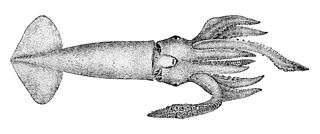
Heteroteuthis hawaiiensis is a species of bobtail squid native to the central and western Pacific Ocean. It occurs in waters off Hawaii, Bonin, the Ryukyu Islands, Indonesia, and the Great Australian Bight. H. hawaiiensis may also be present in Banc Combe in the southwestern Pacific at depths of 795 to 820 m.

A species that is extinct in the wild (EW) is one that has been categorized by the International Union for Conservation of Nature as known only by living members kept in captivity or as a naturalized population outside its historic range due to massive habitat loss.
Lyropupa anceyana is a species of air-breathing land snails, terrestrial pulmonate gastropod mollusks in the family Pupillidae. This species is endemic to the United States.
Lyropupa is a genus of air-breathing land snails, terrestrial pulmonate gastropod mollusks in the family Pupillidae.
Lyropupa clathratula is a species of air-breathing land snail, terrestrial pulmonate gastropod mollusk in the family Pupillidae. This species is endemic to the United States.
Lyropupa lyrata is a species of air-breathing land snail, terrestrial pulmonate gastropod mollusk in the family Pupillidae. This species is endemic to the United States.
Lyropupa microthauma is a species of gastropod in the Pupillidae family. This species is endemic to the United States.
Lyropupa mirabilis is a species of air-breathing land snail, terrestrial pulmonate gastropod mollusk in the family Pupillidae. This species is endemic to Hawaii.
Lyropupa perlonga is an extinct species of air-breathing land snail, terrestrial pulmonate gastropod mollusks in the family Pupillidae. This species was endemic to the Hawaiian Archipelago.
Lyropupa prisca was a species of air-breathing land snail, terrestrial pulmonate gastropod mollusks in the family Pupillidae. This species was endemic to the United States.
Lyropupa rhabdota is a species of air-breathing land snail, terrestrial pulmonate gastropod mollusks in the family Pupillidae. This species is endemic to Hawaii.
Lyropupa scabra is a species of air-breathing land snail, terrestrial pulmonate gastropod mollusks in the family Pupillidae. This species is endemic to Hawaii.
Lyropupa spaldingi is a species of air-breathing land snail, terrestrial pulmonate gastropod mollusks in the family Pupillidae. This species is endemic to Hawaii.
Lyropupa striatula is a species of air-breathing land snail, terrestrial pulmonate gastropod mollusks in the family Pupillidae. This species is endemic to Hawaii.
Lyropupa thaanumi is a species of air-breathing land snail, terrestrial pulmonate gastropod mollusks in the family Pupillidae. This species is endemic to Hawaii.
The anchialine pool snail, scientific name Neritilia hawaiiensis, is a species living in brackish estuaries and in anchialine pools. These snails have an operculum, and are aquatic gastropod mollusk in the family Neritiliidae.

Ctenochaetus hawaiiensis are a species of reef surgeonfish in the family Acanthuridae. They were first described by ichthyologist John Ernest Randall in 1955.

The Hawaiian garden eel is an eel in the family Congridae. It was described by John Ernest Randall and James Robert Chess in 1980. It is a marine, tropical eel which is known from the Hawaiian archipelago, in the eastern central Pacific Ocean. It is non-migratory, and is thought to be restricted to the region. It dwells at a depth range of 11 to 53 metres, and leads a benthic life, forming burrows in sand. Males can reach a maximum standard length of 59.8 centimetres (23.5 in).

Nototodarus hawaiiensis, the Hawaiian flying squid, is a species of squid. It mainly lives at depths of about 400 - 570 m. It lives in the Pacific Ocean from Hawaiian Islands to Midway Island. It is listed as a Least Concern species by the IUCN red list.





